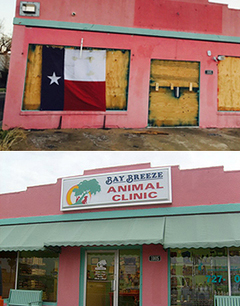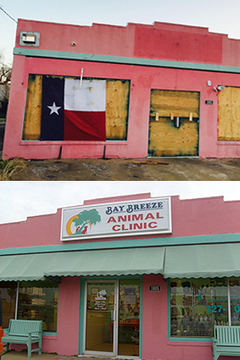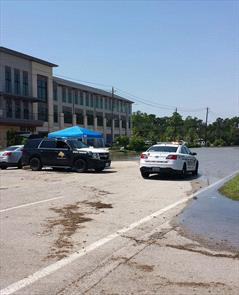
Flood Damage, before and after

Facebook photos
Bay Breeze Animal Clinic sustained major damage in Rockport, Texas. Owner Dr. Kimberly Harrell posted after-and-before images of the building on Facebook and announced plans to reopen.
Recovery and rescue workers are bracing for a surge in numbers of injured and displaced animals today and throughout the weekend, now that floodwaters are receding in Houston.
At the same time, many area residents — veterinarians included — are getting their first hard look at the damage caused by Harvey. The slow-moving storm roared into southeastern Texas on Aug. 25 as a Category 4 hurricane, bringing catastrophic winds, heavy rains and massive flooding. Authorities reported today that the human death toll passed 40.
Gulf Coast Veterinary Specialists, one of the world's largest and best-known veterinary specialty and emergency practices, was evacuated last weekend as the Buffalo Bayou crested, flooding the facility.
"As you can imagine, right now our focus is on our people and the pets in the area," Dr. Karin Beale, a dermatologist there, said Thursday. "It just stopped raining, and I need to be here at all moments for our people. We are working very hard to be operational."
The Texas Veterinary Medical Association reports that at least 17 veterinary practices are impacted in metropolitan Houston, an area the size of New Jersey.
Practice owner Dr. Kimberly Harrell gave away donated dog food today at Bay Breeze Animal Clinic in Rockport, a small coastal town that's a four-hour drive south of Houston.
Although the practice building is severely damaged, Harrell can access patient records electronically and is working remotely. On Thursday afternoon, she sounded optimistic: "Bay Breeze is still standing and with time and patience we will get through this!" she announced on Facebook.
Dr. William Folger of Memorial Cat Hospital near downtown Houston, said his home is dry and floodwaters stopped just 150 yards west of his practice. Many of his colleagues are less fortunate.
"My rough estimate is that about 50 percent of the veterinary hospitals in Houston have structural damage," he said. "If we have another hurricane come through here in the next 30 days, our city will be completely covered with water."
Folger is referring to Irma, a Category 3 hurricane now churning in the Atlantic. Meteorologists forecast that it could hit the United States next week; however, they stress that the storm path is highly unpredictable.
What's more certain is the steady uptick in numbers of animals plucked from the aftermath of Harvey, now that floodwaters are receding and rescue workers in Houston are going door-to-door in search of victims.
'First receivers'

Photo courtesy of Dr. William Folger
Water from Houston's submerged Beltway 8 crept within 150 yards of Memorial Cat Hospital, which reopened today. Like many veterinarians, owner Dr. William Folger shared the status of his practice on Facebook: "All of the staff are well, although some are displaced. And a few vehicles and homes may not make it, but we all survived. We have each other, that's the important thing."
Aspiring veterinary technician Amber Chan is among a number of volunteers caring for displaced animals at Freeman Coliseum, home of the Central Hockey League team in San Antonio. The facility, now outfitted with large kennels, has taken in about 40 animals, most from in and around Corpus Christi.
Those animals have started to return to their owners, Chan said. However, a new population from Houston is expected, due to slowed rescue efforts in flooded regions. "It's been a little hard to get out of Houston because of how flooded it is," she said.
The Houston Society for the Prevention of Cruelty to Animals posted video today that depicts an agency rescue worker gingerly standing in a canoe, loading animals though the window of a flooded home in Jersey Village.
Animal welfare agencies such as the Humane Society of Missouri, Austin Humane Society and SPCA of Texas also have been credited with transporting, rescuing and finding homes for the area's displaced animals.
Angela Clendenin, a public information officer with the Texas A&M Veterinary Emergency Team, said the team's 25 members are stationed at various locations around Houston and its suburbs, ready to care for displaced and injured animals as well as search-and-rescue canines. Requests for help have come from Rockport, Brazoria County and Chambers County. A base has been established in Corpus Christi, and a three-member team is supporting the Federal Emergency Management Agency in Katy.
"We expect that within the next 24 hours, we'll be really busy," Clendenin said. "When a storm is coming and water is rising, animals instinctively are trying to get away and move to higher ground; they run off."
Fearful animals are hard to rescue, Clendenin explained. "It really takes until the waters recede and search-and-rescue teams can go from house-to-house before pets start getting found. And then they bring them to us. … It's a slow process."
Ways to help